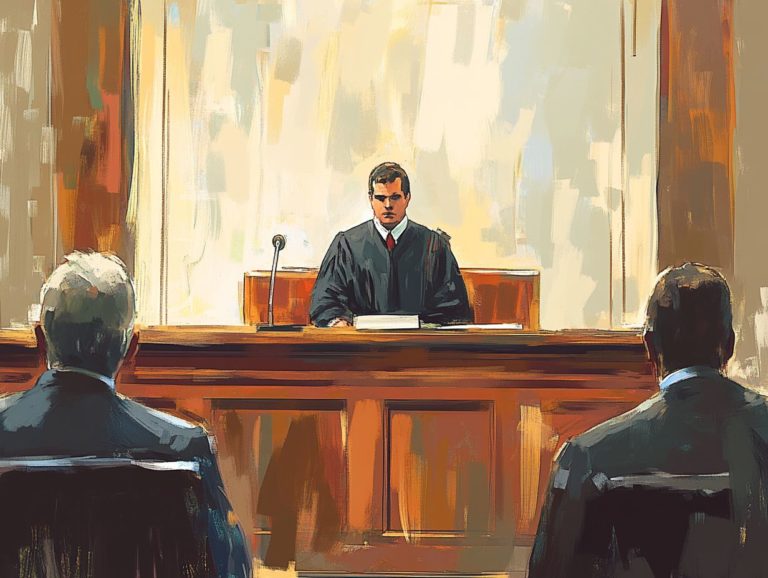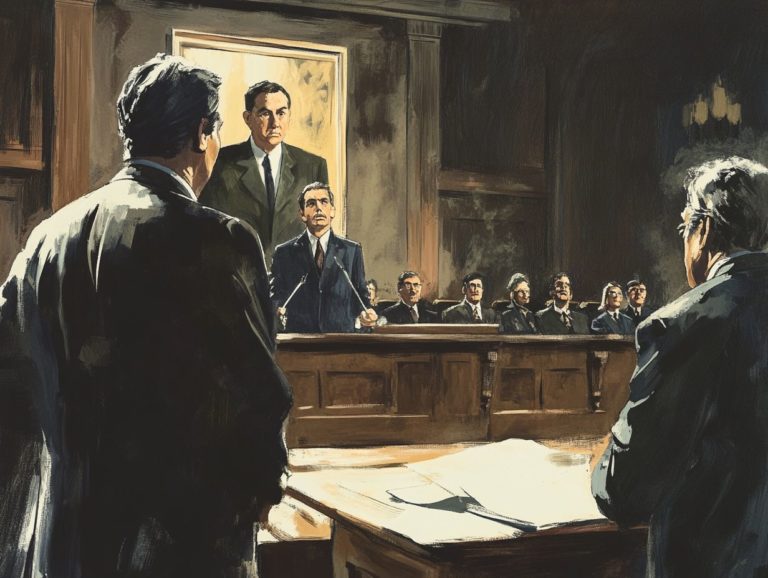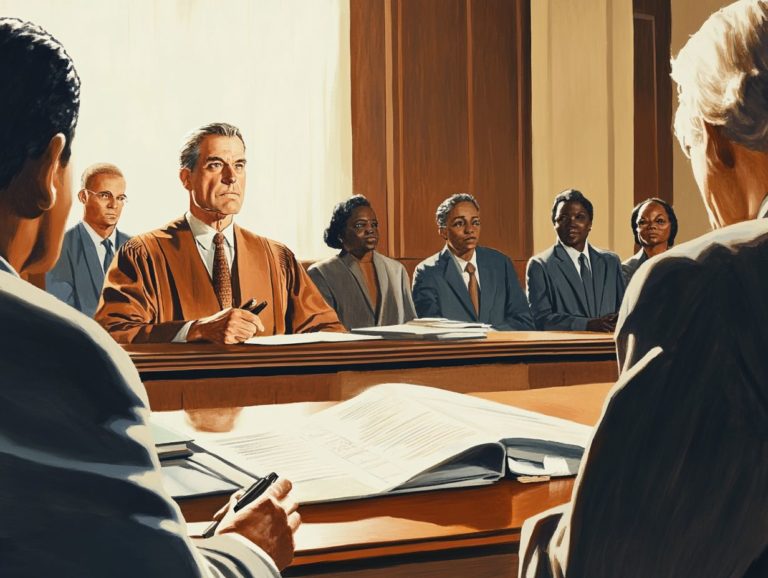Understanding Reasonable Doubt in Defense
In the realm of criminal justice, the concept of reasonable doubt stands as a cornerstone of the legal system. It s more than just a phrase casually thrown around in courtrooms; it s a critical standard that can sway the outcome of a trial.
Let s dive into the true essence of reasonable doubt. We will examine how defense strategies skillfully leverage it and identify the various factors that shape its perception among jurors.
Through real-life examples and insights into the jury s pivotal role, you ll gain a deeper understanding of how reasonable doubt influences justice in society.
Join us now to uncover the crucial role of reasonable doubt in justice!
Contents
- Key Takeaways:
- What is Reasonable Doubt?
- How Reasonable Doubt is Used in Defense
- Factors that Influence Reasonable Doubt
- Examples of Reasonable Doubt in Court Cases
- The Role of the Jury in Determining Reasonable Doubt
- Frequently Asked Questions
- What is meant by ‘reasonable doubt’ in a legal defense?
- How is ‘reasonable doubt’ different from ‘beyond a reasonable doubt’?
- What factors are considered when determining reasonable doubt in a defense?
- Can the defense use ‘reasonable doubt’ as a defense strategy?
- What is the judge’s role in reasonable doubt cases?
- What happens if the jury cannot reach a unanimous decision?
Key Takeaways:
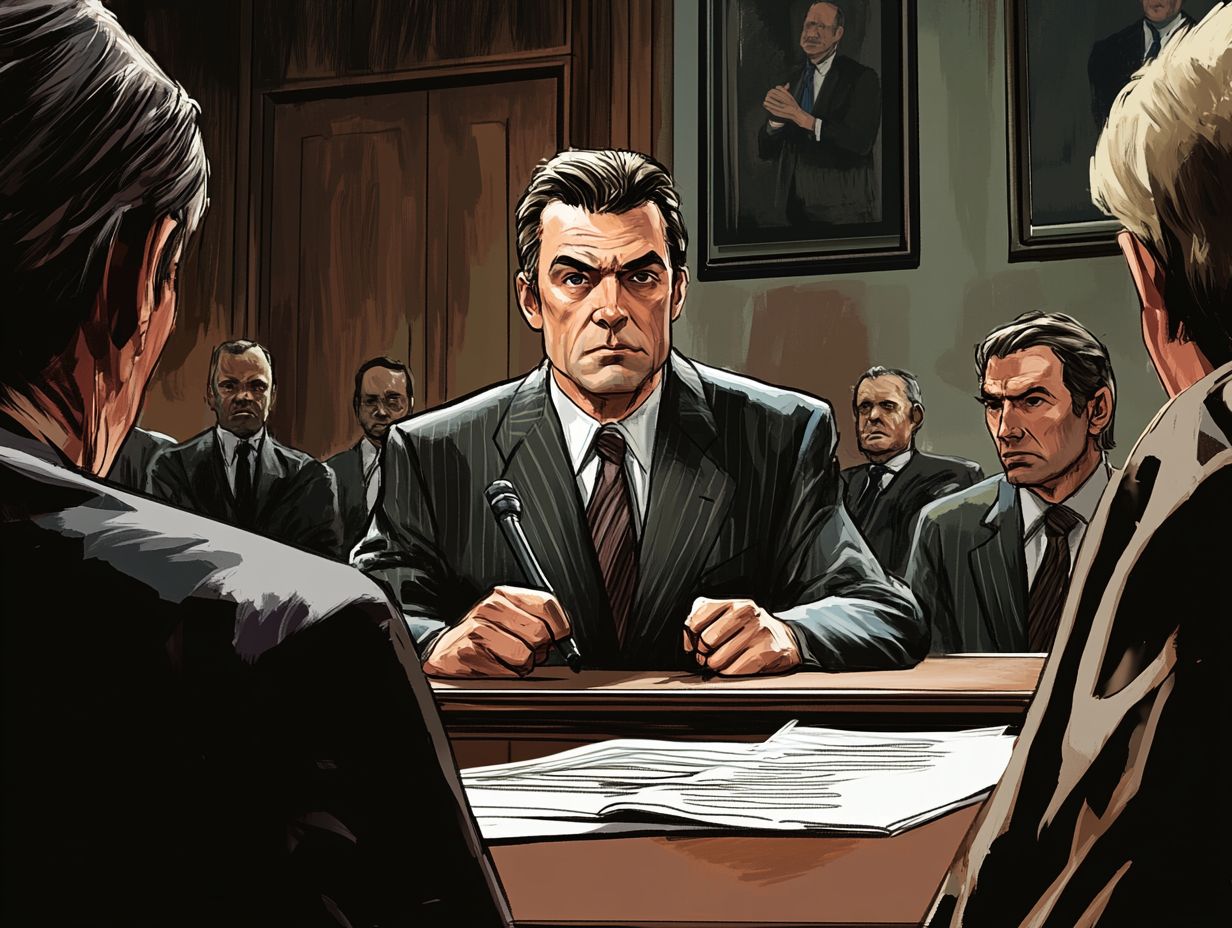
Reasonable doubt is vital for defense attorneys to question a defendant’s guilt effectively. It requires strong evidence from the prosecution.
Defense attorneys use various strategies, such as undermining evidence and questioning witness credibility, to create reasonable doubt in a case. The jury plays a crucial role and is instructed to carefully consider evidence and witness credibility while following specific deliberation processes.
What is Reasonable Doubt?
Reasonable doubt stands as a cornerstone of the criminal justice system. It represents the rigorous standard of proof needed to secure a guilty verdict in a criminal case.
This vital legal principle safeguards the rights of the accused. A defendant is presumed innocent until proven guilty beyond all reasonable doubt.
The responsibility to prove guilt rests squarely on the prosecution. They must present compelling evidence that establishes the defendant’s guilt.
This reinforces the profound belief that it is preferable for several guilty individuals to walk free than for a single innocent person to be wrongfully convicted.
Defining the Legal Standard
The legal standard of reasonable doubt is the bedrock of the criminal trial process. It compels the prosecutor to establish the defendant’s guilt to a level that leaves any rational person firmly convinced of the truth of the allegations.
This high bar isn’t just a formality; it profoundly shapes how cases are presented and resolved in courtrooms across the nation.
Under this standard, if there exists any reasonable possibility that the accused did not commit the crime, the jury is obligated to acquit. This safeguards individuals against wrongful convictions.
For example, in many jurisdictions, a defense attorney might highlight inconsistencies in witness testimonies or propose alternative theories to instill doubt. Such instances underscore the delicate balancing act both the prosecution and defense must perform, ensuring that the scales of justice remain fair and equitable, ultimately fostering public trust in the legal system.
How Reasonable Doubt is Used in Defense
In criminal defense, reasonable doubt serves as a pivotal element in crafting strategies that defense attorneys utilize. This is crucial for optimal outcomes for their clients, especially in cases where the stakes of a conviction are extraordinarily high.
Strategies for Creating Reasonable Doubt
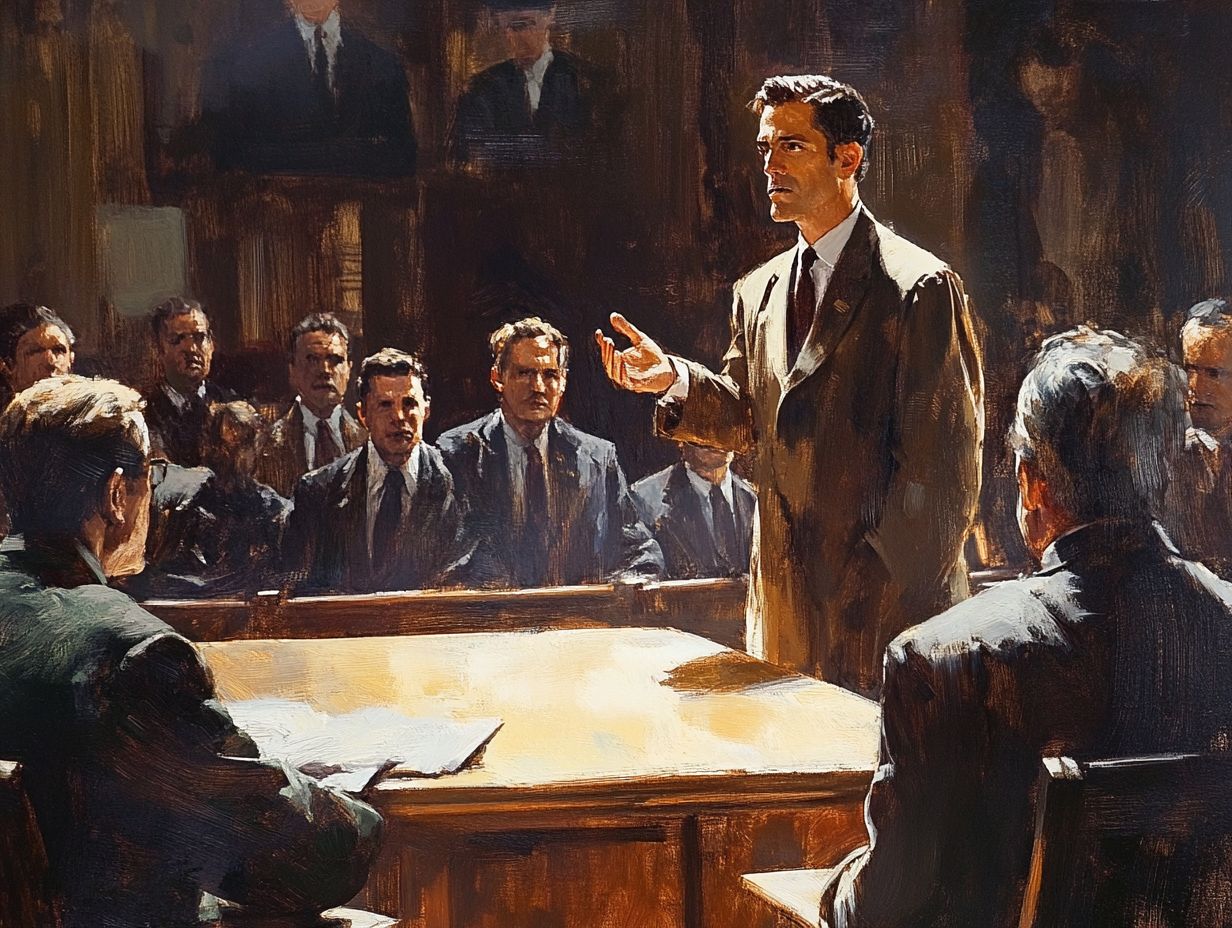
Creating reasonable doubt requires careful strategies. Defense attorneys skillfully employ a variety of methods to challenge the prosecution’s case.
This often involves presenting reasonable beliefs and spotlighting the insufficiency of the prosecution’s evidence.
Defense attorneys often cross-examine witnesses to uncover inconsistencies in their testimonies. This prompts jurors to question their reliability.
Expert testimony provides alternative views on the evidence, bolstering the defense narrative’s credibility. Introducing plausible alternative explanations for the events in question can further cloud the prosecution’s claims.
The importance of credible witnesses is paramount. Their reliability can significantly influence jurors’ perceptions, nudging them toward a more skeptical view of the evidence presented.
Ultimately, it’s this intricate interplay of questioning, expert insights, and credible testimony that aims to construct a formidable wall of doubt around the prosecution’s case.
Factors that Influence Reasonable Doubt
Several factors shape a juror’s perception of reasonable doubt. Key factors include the strength of the evidence and the trustworthiness of the witnesses.
The clarity of the jury instructions provided throughout the trial also plays a significant role in how reasonable doubt is understood by jurors.
Evidence, Witness Credibility, and Jury Instructions
In the courtroom, the dynamic interplay of evidence, witness credibility, and jury instructions profoundly influences your perception of reasonable doubt. You act as a rational individual, weighing the information presented to you.
As you sift through testimonies and physical evidence, your ability to discern the reliability of each witness becomes crucial. It s essential to consider not only the facts laid before you but also the motivations and backgrounds of those presenting the information. These factors can significantly shape your understanding of the case.
Jury instructions are critical tools in this process. They provide a framework that guides you in fulfilling your responsibilities with fairness. These guidelines help you navigate the complexities of reasonable doubt, steering you toward a balanced evaluation that prioritizes justice above all else.
Examples of Reasonable Doubt in Court Cases
Real-life court cases provide valuable insights into how reasonable doubt works. They highlight the prosecution’s challenge in meeting the burden of proof, which means providing enough evidence to convince you of the defendant’s guilt.
Real-life Examples and Outcomes

Real-life examples of reasonable doubt in court cases vividly illustrate diverse outcomes from varying interpretations of evidence and legal standards within the criminal justice system.
By looking into cases such as the acquittal of a defendant in a high-profile murder trial or the conviction of an individual based on circumstantial evidence, you can see how jurors evaluate the reliability and credibility of testimonies.
Factors like the emotional weight of the defense’s narrative or the perceived integrity of witnesses can significantly influence the jury’s consensus.
Moments of intense deliberation among jurors reveal a trend: the decision to convict or acquit often relies not only on facts but also on the emotional resonance of the arguments made.
These cases show that reasonable doubt is more than just uncertainty; it s about the complex factors that influence legal decisions.
The Role of the Jury in Determining Reasonable Doubt
The jury plays a pivotal role in discerning reasonable doubt. Its members assess the evidence and apply the given instructions throughout the deliberation process to arrive at a just verdict.
Instructions and Deliberation Process
The jury instructions serve as essential guideposts for you as a juror, steering you through the deliberation process. They ensure you understand the concept of reasonable doubt and its pivotal role in your ultimate verdict.
These instructions are precisely crafted by judges and tailored to each specific case, aiming to clarify the legal standards you must apply. As you absorb these instructions, remember that your decision must rest solely on the evidence presented and the law, helping to structure your thought process.
During deliberation, the clarity of these guidelines significantly influences how you and your fellow jurors discuss and interpret the evidence. This ultimately shapes your collective understanding of what constitutes reasonable doubt.
This process not only informs your perspectives but also plays a crucial role in determining the final outcome of the criminal trial.
Frequently Asked Questions
What is meant by ‘reasonable doubt’ in a legal defense?
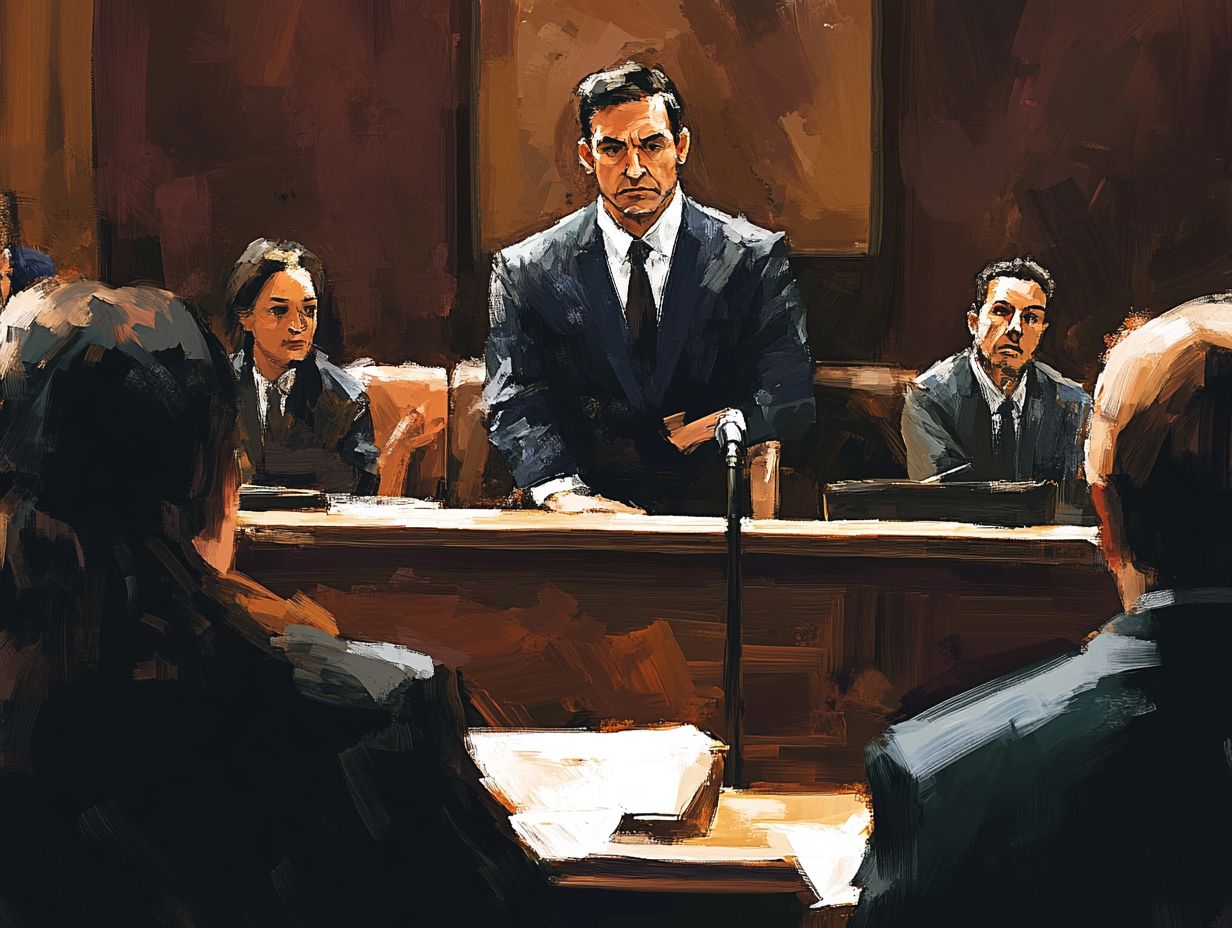
‘Reasonable doubt’ refers to the level of certainty a jury must have to find a defendant guilty of a crime. It is the standard of proof used in criminal cases, meaning the evidence presented must be strong enough to leave no reasonable doubt in the minds of the jury that the defendant is guilty.
How is ‘reasonable doubt’ different from ‘beyond a reasonable doubt’?
In some legal systems, ‘beyond a reasonable doubt’ replaces ‘reasonable doubt.’ While the terms are often used interchangeably, they both refer to the same standard of proof. This means that evidence must be strong enough to eliminate any reasonable uncertainty in the minds of the jury.
What factors are considered when determining reasonable doubt in a defense?
The jury evaluates all evidence presented by both the prosecution and defense. They also assess witness credibility and the strength of the arguments from both sides.
Can the defense use ‘reasonable doubt’ as a defense strategy?
No, ‘reasonable doubt’ is not a defense strategy in criminal cases. It’s the prosecution’s job to prove the defendant’s guilt beyond a reasonable doubt while the defense challenges the evidence and offers alternative explanations.
What is the judge’s role in reasonable doubt cases?
The judge instructs the jury on legal principles, including reasonable doubt. They help the jury evaluate evidence to determine if it meets the required standard for a guilty verdict.
What happens if the jury cannot reach a unanimous decision?
If the jury cannot agree on reasonable doubt, it results in a hung jury. This situation may lead the judge to declare a mistrial. The case could then be retried with a new jury, or the prosecution might offer a plea deal to avoid retrial.


